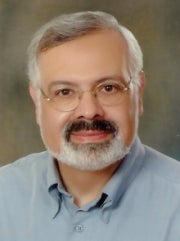 Mohamed
Kamel,
a
recently
retired electrical
and
computer
engineering
professor,
died
December
4.
Mohamed
Kamel,
a
recently
retired electrical
and
computer
engineering
professor,
died
December
4.
Kamel joined the University of Waterloo in January 1985 as a systems design engineering assistant professor and joined the electrical and computer engineering department in 2004. He retired in July 2015 and was named professor emeritus, continuing as an adjunct professor.
His work, publications and professional activities have benefited and influenced faculty members and students in electrical and computer Engineering, systems design engineering and computer science departments, says a statement prepared by his Fakhri Karray, Otman Basir and Manoj Sachdev, his colleagues in the electrical and computer engineering department.
"His graduates (more than 90 doctoral and MASc candidates) are successful professional and making excellent contributions in academia and industry throughout the world."
A pioneer in the fields of pattern recognition and intelligent systems, Kamel's contributions earned him international recognition and honours icluding being named a Fellow of the Royal Society of Canada, an IEEE Fellow, EIC Fellow, CAE Fellow, IAPR Fellow, winning the IEEE Canada McNaughton Award, and membership on editorial boards of international journals.
CPAMI co-founder and successful entrepreneur
He was a co-founding member of the Centre for Pattern Analysis and Machine Intelligence (CPAMI), of which he was the director.
In 1986, Kamel co-founded Virtek Vision International with Tom King, Andrew Wong and Bob Nally. Virtek commercialized research developed in the Pattern Analysis and Machine Intelligence Laboratory and was acquired by Gerber Technology in 2008. He served on its board and as Chair of Virtek's Technology Advisory Group.
He will be sorely missed by his current and former students, colleagues at the University and from around the world and by the research community at large," said his ECE colleagues. "His passing is a major loss to all those who have known him and to the scientific community at large."